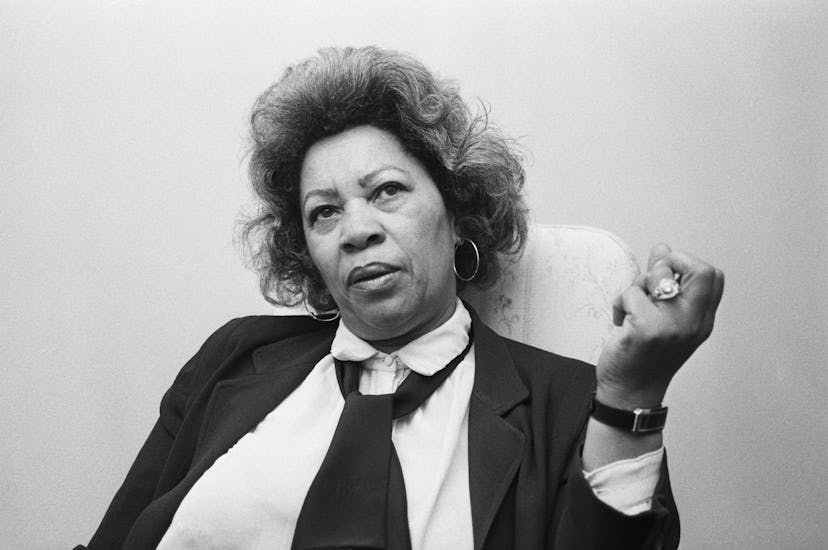Toni Morrison’s Most Powerful Speeches and Interviews

Toni Morrison, who died yesterday at the age of 88, will be best remembered for her powerful mastery of language on the page as captured in her novels like Blue Eyes and Beloved, but Morrison was also keenly aware of the power of narrative and language in all of its forms. Never one comfortable with the idea of embodying the stereotype of the reclusive and ornery literary genius (a place that so many of her white male contemporaries, with their privilege and fragility, found easy to rest in), Morrison was a frequent and powerful public speaker as detailed in her many speeches and interviews over the years. While one can get lost in the words of her novels in the stacks of their local libraries, one can also get lost in Morrison’s spoken words as preserved across the internet. Whether addressing the intellectual elite in Stockholm, disarming combative interviewers, or talking to the millions who watch Oprah, Morrison always got her point across and more. While not all of her most notable speeches have been archived on easily accessible video (read details of her 1981 keynote speech at the American Writers Congress here and her 1975 address to Portland State University here, for starters), here are some of her best public speaking moments available on line.
1993 Nobel Prize for Literature Acceptance Lecture
Though Bob Dylan (somewhat controversially) was awarded the Nobel Prize for Literature in 2016, Morrison was the last American novelist to win the award, and the last American to actually show up to deliver a lecture to accept. She chose a powerful rumination on the power of language and stories beyond just the page. “Narrative is radical, creating us at the very moment it is being created,” she said.
2004 Commencement Speech to the Graduation Class of Wellesley College
Delivering in 2004 in the midst of the Iraq War, Morrison didn’t avoid all the clichéd platitudes associated with commencement speeches but rather turns them on their head. She didn’t extoll the possibilities of the future (she’s not even certain that it’s guaranteed), reminded students that the past is a living thing still to be redefined and examined, chided some youthful nihilism, but also questioned the idea of a member of one generation passing on wisdom to another. Though ultimately she ended on a hopeful note. “You are your own stories and therefore free to imagine and experience what it means to be human without wealth,” she said. “What it feels like to be human without domination over others, without reckless arrogance, without fear of others unlike you, without rotating, rehearsing and reinventing the hatreds you learned in the sandbox. And although you don’t have complete control over the narrative (no author does, I can tell you), you could nevertheless create it.”
2000 Interview with Oprah Winfrey
No one in the popular culture championed Morrison and her work more than Winfrey. She not only convinced the author to allow her to adapt her novel Beloved for screen, but featured her numerous times on her programs. Winfrey, in particularly, credits this moment, in which Morrison describes the way she communicated with her children, for inspiring an “aha moment” that “that everybody just wants to be appreciated or validated.”
1993 Interview with Charlie Rose
Though Rose’s own reputation plummeted after allegations of sexual harassment in 2017, don’t let that overshadow the massive amount of incite and knowledge Morrison drop in this 1993 interview from PBS. Most notable if her stern takedown on white supremacy and white people’s complacency in systematic racism:
“If I take your race away, and there you are, all strung out. And all you got is your little self, and what is that? What are you without racism? Are you any good? Are you still strong? Are you still smart? Do you still like yourself? I mean, these are the questions. Part of it is, “yes, the victim. How terrible it’s been for black people.” I’m not a victim. I refuse to be one… if you can only be tall because somebody is on their knees, then you have a serious problem. And my feeling is that white people have a very, very serious problem and they should start thinking about what they can do about it. Take me out of it.”
1998 Interview with Jana Wendt
In a notorious interview with British journalist Jana Wendt, Morrison is asked why she both “marginalizes” white people in her work and if she’s ever write “sustainably” about white character. Morrison interjects with, “You can’t understand how powerfully racist that question is, can you?” before breaking it down for her.
Related: Toni Morrison in Milan Toni Morrison Remembered For Her “Essential and Formative” Work